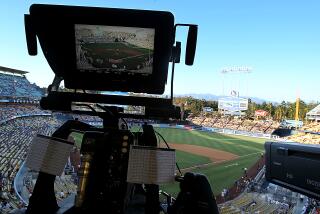Dodgers fans find ways around local blackout
John Franks doesn’t subscribe to Time Warner Cable, but that didn’t stop him from putting his feet up on the bed to watch Clayton Kershaw lead the Los Angeles Dodgers to a win on TV.
The die-hard fan hasn’t missed any games lately despite the ongoing partial blackout. It’s all thanks to a legally dicey solution being whispered across parts of Dodger nation that’s roiling content providers everywhere.
Fans are subscribing to virtual private networks, or VPNs, which are Internet services that enable them to sidestep local blackouts of Dodgers games on MLB.TV, Major League Baseball’s popular online broadcasting platform.
Franks’ VPN routes his MLB.TV sign-on to computer servers in Mexico, outside the Dodgers’ exclusive broadcasting zone. That allows him to masquerade as an out-of-region viewer and access local games through his MLB.TV subscription.
“It’s as if I have Time Warner,” said Franks, 20, who connects his laptop to his TV to get the Dodgers cable experience.
The Pasadena resident pays about $25 a month for the online games and the VPN, about a quarter of what a typical cable package would cost.
The practice violates MLB.TV’s terms and conditions. Violators risk losing their service and paying a $100 early termination fee. In addition, some lawyers say, the VPN workaround could violate provisions of the Digital Millennium Copyright Act and the federal Computer Fraud and Abuse Act.
But VPN users like Franks say they don’t feel a tinge of guilt — not with the way Dodgers fans have been squeezed by the broadcast impasse. The recently scuttled merger between Time Warner Cable and Comcast Corp. isn’t expected to help either.
Fans began looking for other TV alternatives after about 70% of households in the Dodgers’ TV market were blacked out after a money dispute between Time Warner Cable and other cable and satellite TV providers over how much each would have to pay to show the games.
“It’s terrible,” said Jesse Navarrette, a longtime Dodger fan and Azusa resident who struggled to find a restaurant that carried Time Warner Cable on opening day. “We ended up in a bar in San Dimas. It was a huge hassle.”
The experience led him to sign up for MLB.TV and a popular VPN service called Private Internet Access. He even took to Twitter, encouraging fans to do the same. “I’d pay for Time Warner if it was available where I live,” said Navarrette, 30.
Dodger fans are following the example of many across the world who want to catch TV shows and sporting events that are subject to regional blackouts, also known as geo-blocking. Netflix, HBO, Hulu and Amazon are all being accessed with VPNs outside the U.S., to the chagrin of content providers, whose licensing fees are typically priced for U.S. viewers only. If a global audience was factored in, those fees would soar and the costs probably would be passed to subscribers.
“That’s why you can’t count geo-blocking as plain bad,” said Marketa Trimble, a law professor at the University of Nevada, Las Vegas, who has studied VPNs. “It’s a tricky issue.”
Trimble was skeptical that subscribers would face any significant legal repercussions for using circumvention tools. However, VPN providers are more vulnerable because they could be accused of facilitating the spread of unlicensed entertainment.
“VPN providers are very careful about what they say about their services now,” Trimble said. “A few years ago, a lot of their websites would say ‘Look, you can watch anything in the world no matter what the limitations are.’” Now many downplay that angle.
What makes the issue all the more complex, Trimble said, is that cracking down on VPNs goes against the best interests of services such as Netflix and MLB.TV, whose success depends on growing its subscriber base.
Content providers have noticed. Netflix caught the ire of Sony brass in 2013 for not doing enough to stop viewers overseas from circumventing geo-blocking.
“This is in effect another form of piracy — one semi-sanctioned by Netflix,” wrote Keith Le Goy, Sony’s president of international distribution, in a hacked internal email recently released by Wikileaks.
Time Warner Cable declined to comment about MLB.TV’s enforcement of VPNs. Bob Bowman, head of baseball’s digital arm, MLB Advanced Media, said the league did not take the circumvention technology lightly.
“It’s not a victimless crime,” Bowman said. “It seems innocent, but it’s really not. It’s a big ecosystem where everyone has to do his or her share.”
Bowman said the league looks for inconsistencies between billing addresses and where games are being watched. When the league suspects someone of using a VPN, it contacts the subscriber to point out that the practice violates MLB.TV’s service terms.
Bowman doesn’t think VPNs are necessarily on the rise, however. Viewership of Dodgers games on MLB.TV has been in modest decline the last few years, he said — although the only people who are supposed to be watching Dodger games on MLB.TV live in other regions. Bowman said he has no precise idea how many local fans watch the Dodgers through VPNs.
But VPN providers say business is soaring. Private Internet Access, a Los Angeles-based site launched in 2010, has about half a million customers worldwide and growing.
Major League Baseball, which owns MLB.TV, finds itself caught between honoring lucrative, long-term cable TV contracts, which serve an older audience, and providing cheaper, more convenient digital access to younger fans. By not showing local team games on the smartphones of hometown millennials, MLB could be missing a big chance to attract new legions of baseball fans.
For now, it’s established, hard-core fans who are turning to the VPNs for digital access to home team games. The services are marketed as a security tool, the original purpose for VPNs, which were developed to encrypt Web traffic. But it’s become obvious in recent years that the service is also favored to circumvent geo-blocking. Australian traffic to Private Internet Access, for example, has grown fivefold on the strength of Netflix’s popularity.
Joseph Craig, Private Internet Access’ marketing director, said the company strategically leaves no record of its customers’ Web traffic.
“We don’t log,” Craig said. “That protects us and users from any inquiries. We can tell Major League Baseball we can’t control what users are doing because we can’t see what users are doing.”
Not all providers advertise their services as subtly. The Barbados-based Unblockus promotes itself as a way to access a slew of sports such as English Premier League soccer, Formula 1 racing, NBA basketball and MLB.
Baseball fan Drew Rynsburger uses Unlocator, a Danish VPN provider, which touts its ability to tune into hundreds of TV channels and streaming services such as Amazon Video.
The Tulare, Calif., resident uses a VPN to watch the Angels through his MLB account. His cable provider, Comcast, gives him only Giants and Athletics games — a pair of teams he could not care less about.
“I’m paying MLB for their games and they’re not giving it to me,” said Rynsburger, 28. “That’s my justification for using a VPN.”
Twitter: @dhpierson







